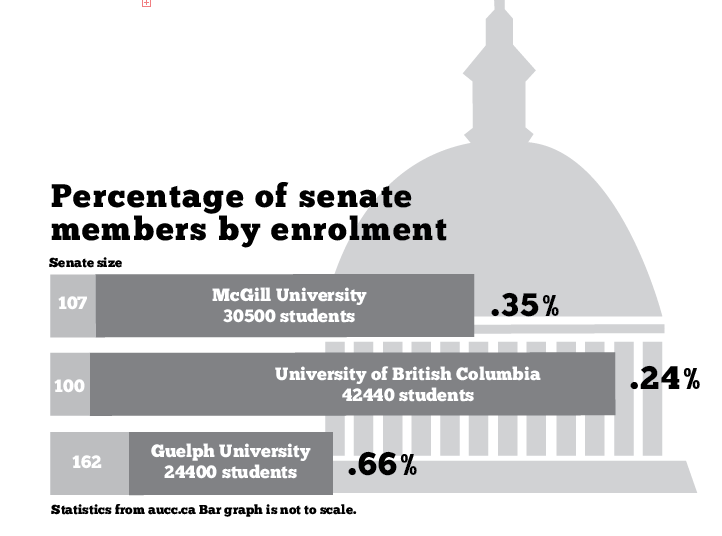The McGill Senate could face changes to its membership and operation following a discussion about its purpose at its Oct. 16 meeting.
Principal Suzanne Fortier said a working group of senators will be formed to create recommendations about potential changes to Senate’s structure and operations, which will then be voted on at a future Senate meeting.
Topics under consideration at Wednesday’s meeting included Senate’s purpose and function, as well as time allocation, size, the principal’s role to chair meetings, and Senate’s role in making academic decisions. McGill’s Senate is the main governing body that oversees the academic activities of the university. According to its Rules of Procedure, Senate can revise the conduct of their own meetings.
“The present rules may be amended by a majority vote of those present at any regular or special meeting,” the document reads.
However, approval from the Board of Governors is required in order to revise Senate’s composition.
At Wednesday’s meeting, some senators said they were dissatisfied with the lack of debate motions receive before passing through Senate. Post-Graduate Students’ Society (PGSS) Secretary-General Jonathan Mooney pointed to Senate’s format as part of the problem.
“Rather than just getting presentations for information and approving things that have already been decided, there need to be opportunities where the competencies and qualifications of Senate are used in the decision making process,” he said. “There should be times when we disagree. We should get some engagement that way.”
Political Science Professor and Faculty of Arts Representative Catherine Lu used McGill’s decision to offer Massive Open Online Courses (MOOCs) last year as an example of an academic decision that passed without much input or debate by Senate.
“When I started [on Senate], I thought I’d be taking part in decision making about academic matters of the university,” she said. “I was astounded by the lack of process with respect to [the decision] last year [.… Senate’s] participatory role was neglected; open discussions failed to allow Senate to contribute.”
Religious Studies Representative Haley Dinel suggested that Senate needs to take steps to encourage debate.
“Senate is the ideal institution to have debates on any given issue,” Dinel said. “Perhaps we should have a 20-minute window in which senators could bring forth issues to debate.”
Another suggestion was to provide more information to senators ahead of the meeting to allow them to consider the information. Arts Representative Lydia White suggested presenting fewer annual reports to make more time for Senate to discuss policy-related issues.
“Our annual reports are quite uncontroversial,” White said. “Making them available to senators to ask questions about them without presenting them […] would free up time for the more policy-related issues that Senate might be discussing.”
However, Faculty of Science Representative Gregory Dudek argued that many issues addressed at Senate require a large amount of time for explanation, and that there is not enough time to both fully explain and debate these topics in meetings.
“It’s hard to imagine engaging in debate on big issues without having meetings every day,” he said.
Other senators questioned the composition of Senate. Law representative Guillaume Blais pointed to his previous experience as a member of the University of Guelph’s senate to suggest reducing the number of senators and doing more work in smaller committees.
“At Guelph, this same discussion resulted in reducing the number of Senate members,” Blais said. “There’s merit to work being done in committees.”
107 voting members currently sit on McGill’s senate. In comparison, Guelph’s Senate has 162 members (reduced from 215 members in 2011), and the University of British Columbia has approximately 100.
Another recommendation was from Faculty of Medicine Representative Gary Pekeles, who advocated for Senate to be led by someone other than the principal.
“This committee [should] not be chaired by a single administrator,” Pekeles said. “We should look for leadership coming from the floor.”
Faculty of Science Representative Graham Bell said the conversation ultimately reveals fundamental concerns about the way that Senate operates.
“The question is whether Senate is necessary at all,” Bell said. “The conclusion of the debate is that we are uncertain about what we are in this room for, and perhaps that’s a point well worth investigating. Apparently, in some respects, the business of Senate is failing to perform its function.”










